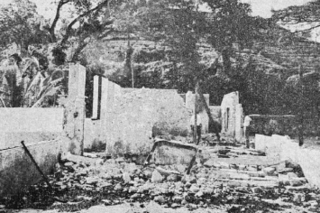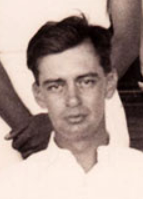Related Research Articles

Solomon West Ridgeway Dias Bandaranaike,also known as "The Silver Bell of Asia",was the fourth Prime Minister of the Dominion of Ceylon,serving from 1956 until his assassination. The founder of the left-wing and Sinhalese nationalist Sri Lanka Freedom Party,his tenure saw the country's first left-wing reforms.

The 1971 Janatha Vimukthi Peramuna (JVP) insurrection was the first of two unsuccessful armed revolts conducted by the communist Janatha Vimukthi Peramuna (JVP) against the socialist United Front Government of Sri Lanka under Prime Minister Sirimavo Bandaranaike. The revolt began on 5 April 1971 and lasted until June of that year. The insurgents held towns and rural areas for several weeks,until the regions were recaptured by the armed forces,following strong support from friendly nations that sent men and material. Although this first attempt to seize power was quickly crushed by force,in 1987 the JVP launched a low-intensity insurgency in the island's southern,central and western regions that lasted several years.

Peduru Hewage William de Silva was a 20th-century Marxist/Trotskyist Sri Lankan politician.

Sir Oliver Ernest Goonetilleke was a Sri Lankan statesman. Having served as an important figure in the gradual independence of Ceylon from Britain,he became the third Governor-General of Ceylon (1954–1962). He was the first Ceylonese individual to hold the vice-regal post.

Patrick de Silva Kularatne was a Sri Lankan educationist and politician. He was a Member of the State Council of Ceylon (1942-1947) and Member of Parliament (1960-1965). He served as Principal of Ananda College and Dharmaraja College and established Nalanda College Colombo,Ananda Balika Vidyalaya,Moratuwa Vidyalaya and Dharmapala Vidyalaya. As a member of the executive committee on Education,he played an instrumental role in the realisation of free education from kindergarten to university.

Colonel Frederick Cecil "Derek" de Saram,OBE,ED was a Sri Lankan lawyer,a Ceylon cricket captain,and an officer of the Ceylon Army. He led the attempted military coup of 1962.
Temple Trees is the official residence of the Prime Minister of Sri Lanka. It is located in Colombo,Sri Lanka. Several recent Presidents have used it as their official residence as well.
The 1962 Ceylonese coup d'état attempt was a failed military coup d'état planned in Ceylon. A group of Christian officers in the military and police planned to topple the government of Prime Minister Sirimavo Bandaranaike during the night of 27 January 1962. Organised by Colonel F. C. de Saram,Colonel Maurice De Mel,,Rear Admiral Royce de Mel,C.C. Dissanayake,Sydney de Zoysa and Douglas Liyanage,it was to take place in the night of 27 January 1962,but was called off as the government gained information in the afternoon and initiated arrests of the suspected coup leaders before the coup was carried out.
Cyril Cyrus "Jungle" Dissanayake,MVO was a Sri Lankan senior police officer. He was serving as Deputy Inspector-General of Police of Range I,when he was implicated as one of the leaders of the attempted military coup of 1962.
Sydney Godfrey de Zoysa was a Sri Lankan senior police officer. A former Deputy Inspector General of Police (DIG) of Range II and Permanent Secretary to the Ministry of Internal Security,he was one of co-conspirators of the attempted military coup of 1962.
S. A. "Jingle" Dissanayake(16 September 1913 - 11 March 1982) was a former Sri Lankan Inspector-General of Police. He played a major role as Deputy Inspector-General of Police of the Criminal Investigation Department in stopping the attempted military coup of 1962. Later in 1971 during the 1971 JVP Insurrection he was appointed as Additional Secretary of the Ministry of External Affairs and Defence and coordinated military and police operations that crushed the insurrection in two months.
Sir Richard Aluwihare,was a Sri Lankan civil servant. He was the first Ceylonese Inspector General of Police and Ceylon's High Commissioner to India.

Alexander Perera Jayasuriya was a Ceylonese politician. He was a Minister of Health,Senator and Member of Parliament. He was one of the founders of the Sri Lanka Freedom Party.
The 1966 alleged Ceylonese coup d'état attempt was an alleged military coup planned in Sri Lanka (Ceylon). The commander of the army and several military personnel were arrested. They were later acquitted of a plot to overthrow the legally elected government.
Santiago Wilson Osmund De Silva was Ceylonese police officer. He was the thirteenth and the first Ceylonese career police officer to become Inspector-General of Police (1955–1959).
Prins Gunasekera was a Ceylonese politician,who represented the Habaraduwa electorate in the Galle district.

Don Stanley Ernest Perera Rajapakse Senanayake was the 18th Inspector General of the Sri Lanka Police (IGP) (1970–1978). Senanayake is the second longest serving IGP,after Sir Herbert Dowbiggin,remaining in the position for seven years.
John Wilhelmus Lucius Attygalle (1906–1981) was the 16th Inspector General of the Sri Lanka Police (IGP) (1966–1967).
Leslie Simon Bernard Perera,CCS was a Sri Lankan civil servant. A career officer of the Ceylon Civil Service,he was the Permanent Secretary of the Ministry of Health and the Ministry of Cultural Affairs and Social Services as Director Civil Aviation,he played a major role in the formation of Air Ceylon. Later he served as High Commissioners of Sri Lanka to Canada.
References
- ↑ "Distinguished Old Anandians". Ananda College . Retrieved 21 March 2018.
- ↑ The Ceylon Civil List, 1954. Colombo: Ceylon Government Press. 1954. p. 181.
- ↑ "Performance Report of the Commissioner General of Title Settlement for the Financial Year 2015" (PDF). Parliament of Sri Lanka. 2015. Retrieved 21 March 2018.
- ↑ Dissanayaka, T. D. S. A. (1975). Dudley Senanayake of Sri Lanka. Swastika. p. 51.
- ↑ "Parliamentary Debates". 36. Parliament of Sri Lanka. 1960: 115.
{{cite journal}}: Cite journal requires|journal=(help) - ↑ "Parliamentary Debates". 36. Parliament of Sri Lanka. 1960: 162.
{{cite journal}}: Cite journal requires|journal=(help) - ↑ "Operation Holdfast: Contours of a Coup Conspiracy". Daily Mirror . 2 November 2012. Retrieved 14 September 2016.
- ↑ Abayasekara, Anne (22 May 2011). "Times of triumph and tribulation written without fear or favour". Sunday Times . Retrieved 14 September 2016.
- ↑ Perera, Janaka (28 January 2008). "Coup attempt that nearly ignited a religious war". Asian Tribune. Retrieved 21 March 2018.
- ↑ "Sri Lankan Sinhalese Family Genealogy". WorldGenWeb Project. Retrieved 21 March 2018.